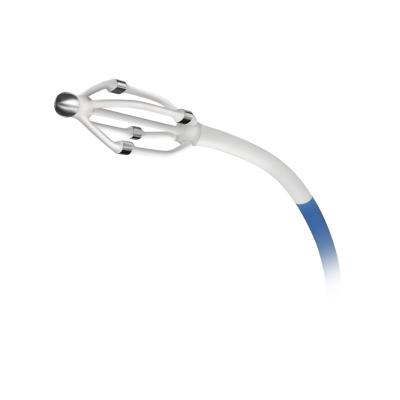
St. Jude Medical Announces First Patient Enrollment in EnligHTN II Renal Denervation Study
February 13, 2013 — St. Jude Medical Inc. announced enrollment of the first patient in the EnligHTN II trial. This post-market clinical study will further evaluate the safety and efficacy of the EnligHTN renal denervation system in patients with uncontrolled hypertension.
The EnligHTN II (IntErnational non-randomized, single-arm, long-term follow-up study of patients with uncontrolled HyperTensioN) trial expands upon the research conducted in the EnligHTN I trial, which demonstrated that patients with drug-resistant hypertension treated with the St. Jude Medical EnligHTN system had a rapid and sustained drop in blood pressure. After thirty days, systolic blood pressure was reduced by an average of 28 mmHg that remained stable with a reduction of 26 mmHg points six months after treatment, an important finding as the risk of cardiovascular death drops by half with every systolic decrease of 20 mmHg.
“There is convincing evidence from studies like the EnligHTN I trial linking renal denervation to improved blood pressure in patients who have drug-resistant hypertension,” said Dr. Johannes Brachmann at Klinikum Coburg in Coburg, Germany. “Expanding this research to patients with less severe forms of hypertension is important as this minimally invasive approach allows for a shorter procedure time and a potentially faster recovery time, which may benefit more patients with uncontrolled hypertension.”
Hypertension occurs when blood pressure in the arteries is elevated, requiring the heart to work harder than normal to circulate blood throughout the body. A typical normal blood pressure reading is below 120 systolic and 80 diastolic — expressed as 120/80 mmHg. To date, the majority of renal denervation studies have only tested the safety and efficacy of this technology in patients with drug-resistant hypertension, which is defined as systolic blood pressure above 160 mmHg, despite being on three or more anti-hypertensive medications including a diuretic.
The EnligHTN II study aims to broaden this scope by evaluating the mean reduction in systolic blood pressure at six months across all enrolled patients post renal denervation and within sub-groups with varying degrees of kidney functionality. The study will be conducted at 40 sites in Europe and Australia and will enroll approximately 500 patients with uncontrolled hypertension.
“St. Jude Medical is dedicated to conducting research that will contribute to the body of evidence supporting the effectiveness of renal denervation in reducing hypertension,” said Frank J. Callaghan, president of the St. Jude Medical Cardiovascular and Ablation Technologies Division. “Through the course of the EnligHTN II study, we expect to gain additional insights into the benefits and sustainability of blood pressure reductions achieved through use of the EnligHTN Renal Denervation System in an expanded patient population.”
According to the World Health Organization (WHO), one in three adults worldwide has elevated blood pressure — a condition that increases the risk of heart attack, stroke and kidney failure.
For more information: www.sjm.com


 January 05, 2026
January 05, 2026 









